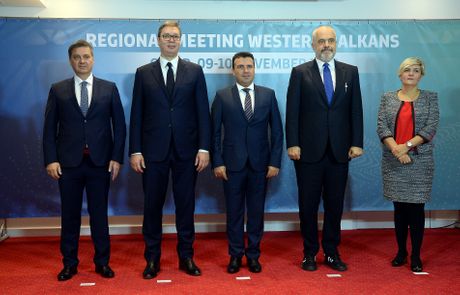Little Schengen: What it means, who it includes, when is the next meeting
A month after launching the initiative for "free movement of goods, people, services and capital" between Serbia, North Macedonia and Albania at a trilateral meeting held in Novi Sad, another meeting was held in Ohrid, where President Aleksandar Vucic and Prime Ministers Zoran Zaev and Edi Rama reached an agreement on specific measures that will contribute to the development and growth of the three countries.
What do these measures bring?
"Little Schengen" implies a number of concrete measures that will ensure full freedom of movement for goods, people, services and capital within the three countries of the region, which is one of the fundamental values of the European Union.
- it has been agreed to introduce a system that would allow travel between countries with only the ID card, joint work permits that would allow people to work in all three countries without additional procedures, while travel without passports to Serbia and Albania may be realized as early as by the end of 2019.
- a "mini Schengen" of a kind - that is, the possibility for foreigners to travel inside the three countries without additional visas once they enter one of them, which will increase the number of foreign tourists and enable the establishment of joint tourist offers and routes;

- joint work permits and recognition of qualifications and diplomas, without additional procedures, which would allow the possibility of labor movement, increasing the availability of the workforce and thus the attractiveness of the whole region to foreign investors;
- exchange of students;
- joint research and development projects;
- introduction of 24-hour opening hours for all border inspection services, with a focus on phytosanitary and veterinary inspection, which will shorten waiting time for trucks carrying goods, while allowing free flow of goods will have multiple effects and increase the competitiveness of the entire region with around 12 million inhabitants;
- a unique "package" of documentation needed for the transit of goods, with an emphasis on introducing a system with as little "paperwork" as possible, that would be consistent with the digital development strategy;

- amendments to the laws in the field of the capital market, tax and financial system in all three countries, in order to create conditions for the smooth flow of capital;
- further strengthening of cross-border cooperation in the field of combating transnational crime and terrorism, through cooperation in the field of migration and emergency assistance;
- defining own rules in many areas, in order to improve attractiveness of the three countries and cooperation - and this initiative can thus become the most important political initiative in the 21st century.
Which countries are included in "little Schengen"?
A month ago in Novi Sad, an agreement was reached on the initiative, which should strengthen the economies of Serbia, North Macedonia and Albania and increase their attractiveness to investors.
Trilateralni sastanak predsednika Republike Srbije Aleksandra Vučića, premijera Albanije Edija Rame i premijera Severne Makedonije Zorana Zaeva.A post shared by Aleksandar Vučić (@buducnostsrbijeav) onView this post on Instagram
The leaders of the three countries then pledged in a joint Declaration on the Free Movement of People, Goods, Services and Capital in the Western Balkans that they would work to enhance regional cooperation in order to increase economic growth, attract investment and raise the quality of life of citizens.
Although "little Schengen" is only talked about in these three countries, it's expected that the idea will soon be approved by the representatives of Montenegro and Bosnia and Herzegovina (BiH), which is why Vucic, Zaev and Rama were joined in Ohrid by the president of the Council of Ministers of BiH, Denis Zvizdic, and Montenegrin Economy Minister Dragica Sekulic.

When is the next meeting?
The next meeting of Western Balkans leaders will be held in Durres on December 21, in the presence of EU foreign policy representative Joseph Borrell. Albanian Prime Minister Edi Rama, however, said in his address after the Ohrid meeting that he would like to see "Montenegro and BiH who will want to enter this whole process" in Durres, adding that so-called Kosovo "should be included in this process, on an equal and legal basis."
(Telegraf.rs)
Video: Pozar u Zemunu, goreo stan u Alaskoj ulici
Telegraf.rs zadržava sva prava nad sadržajem. Za preuzimanje sadržaja pogledajte uputstva na stranici Uslovi korišćenja.

